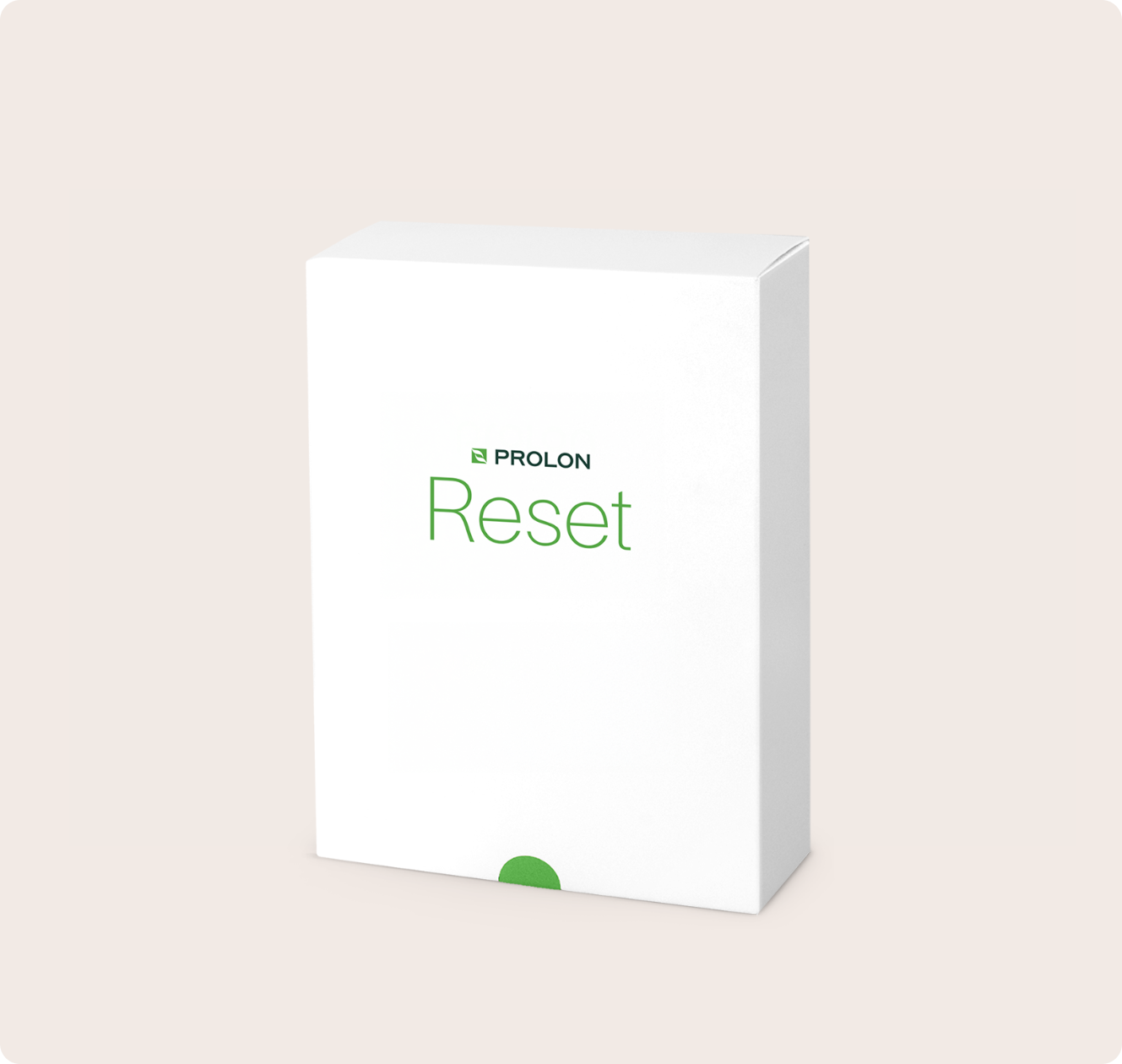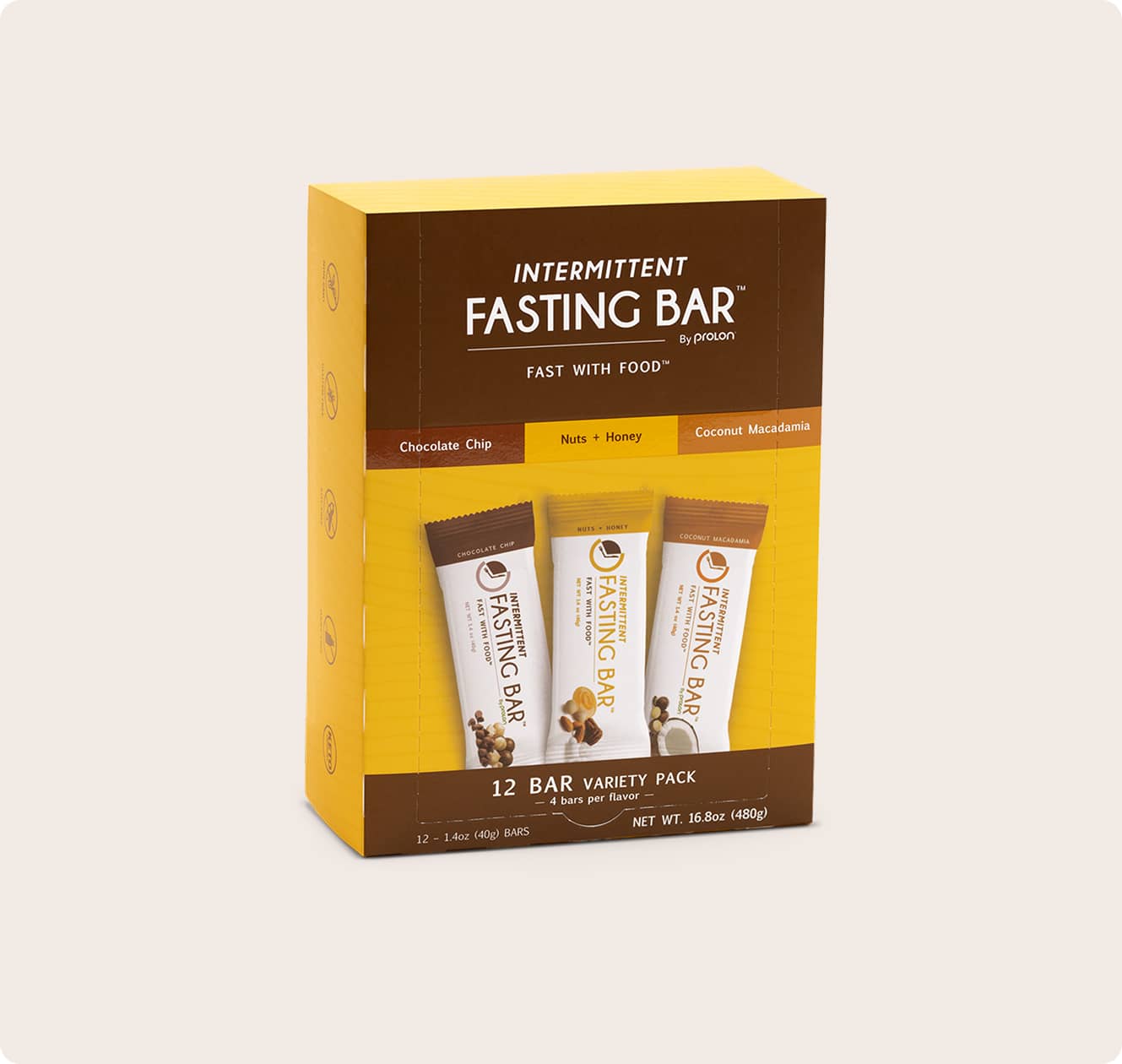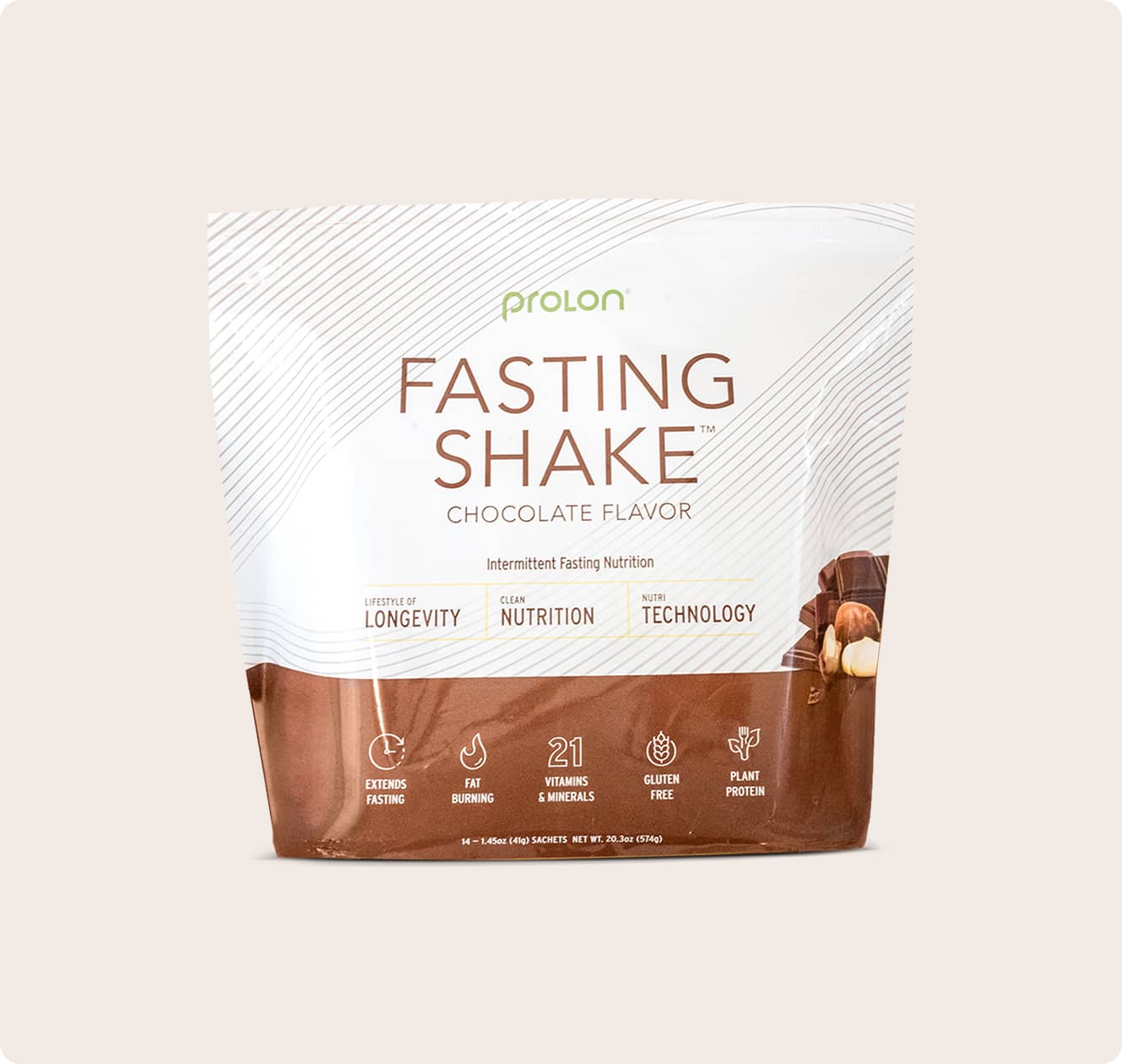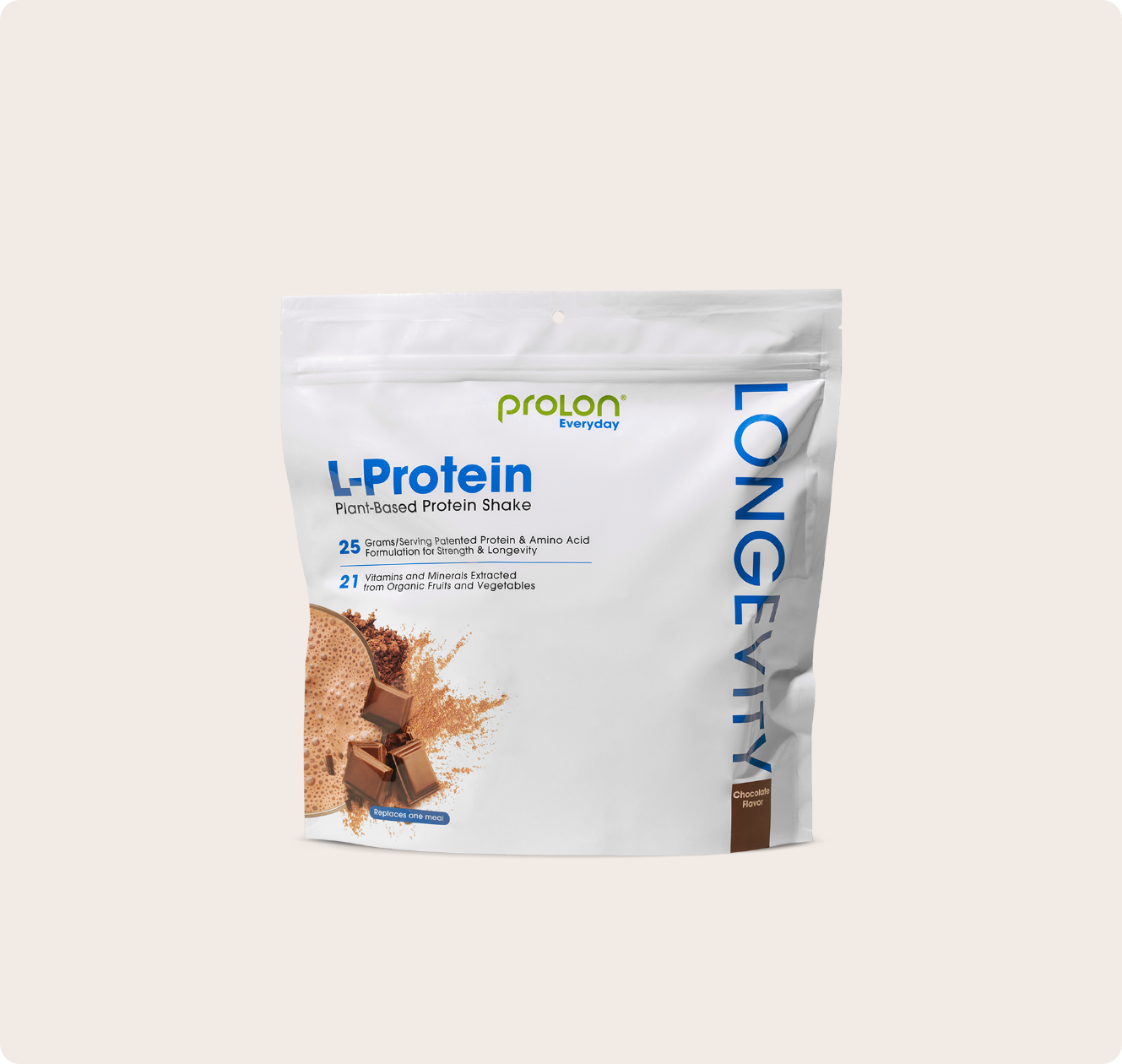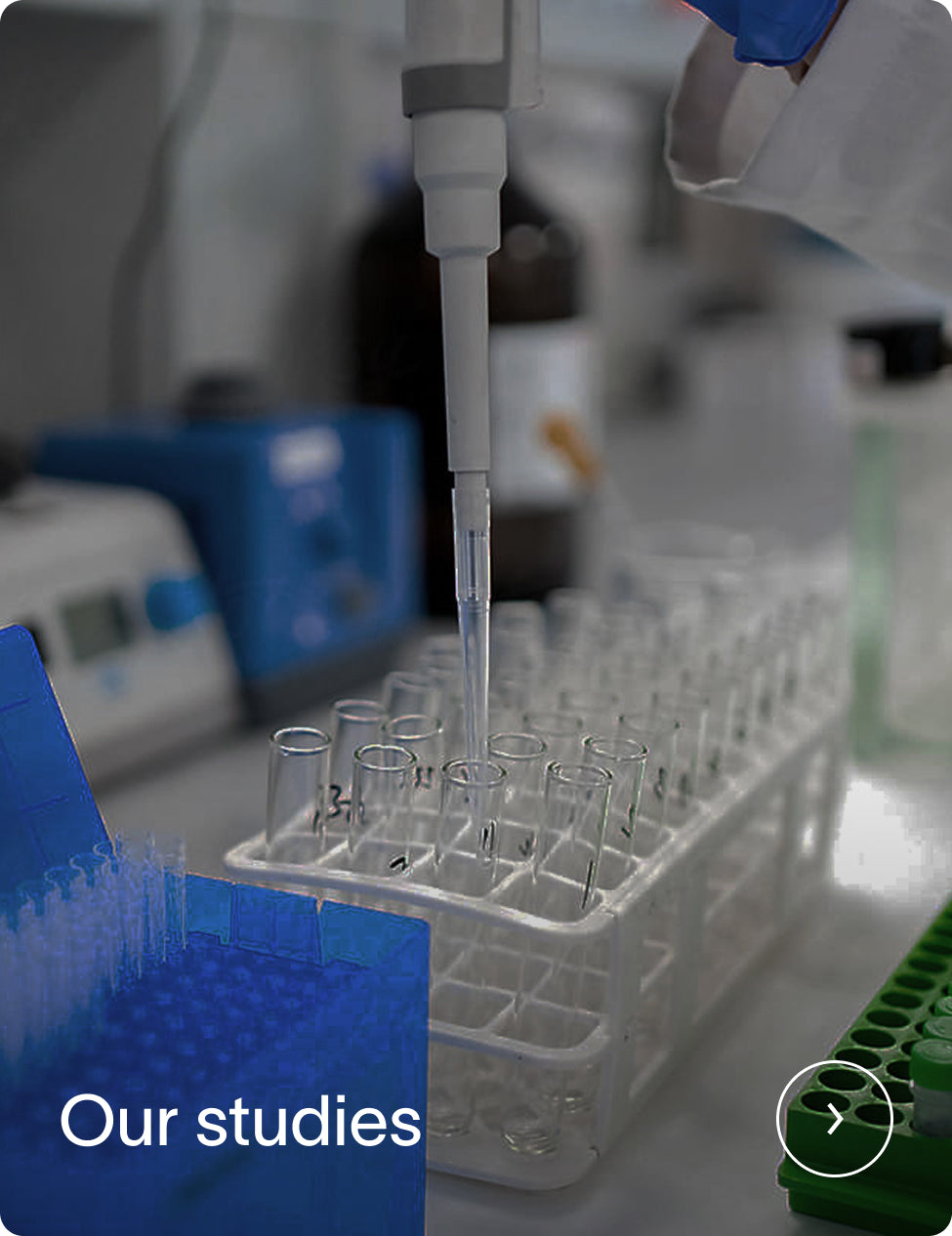Key Takeaways:
- Water fasting is a form of fasting that involves consuming only water, and no food, for a period of time that can range from 24 hours to several days.
- There is little evidence to show that short-term water fasting on its own (less than 72 hours) achieves any substantial or long lasting benefits.
- Prolonged water fasting (more than 72 hours) has been shown to help lower blood pressure, encourage weight loss, reduce inflammation, and lower cholesterol, but these results tend to require longer periods of time and come with more potential risks.
- Prolon’s 5-Day Fasting Mimicking Diet can be a healthier and more effective fasting alternative than water fasting, since it triggers autophagy while still allowing for some food and providing the body nutrients.
Fasting has been practiced around the world for thousands of years, and for many different reasons: religious or spiritual ritual, preparation for certain surgical procedures, weight loss, disease prevention, stress reduction, and improving overall metabolic health and wellness. While generally thought of as an extended period of time where little or no food is consumed, there are many different types of fasting, including intermittent and periodic variants.
One of the more extreme kinds of fasting, however, is the water fast which allows for only water, and no food, over a period of time that may range anywhere from 24 hours to several days. That may seem straightforward on the surface, but the benefits and risks of water fasting are complex and nuanced, and should be carefully considered– and ideally discussed with a healthcare provider—before you make the decision to try one for yourself.
If you’ve been wondering if water fasting is safe for you, let’s explore some of the scientific research behind its benefits, risks, and alternative fasting variations:
What is water-fasting, and how is it different from other kinds of fasting?
As its name implies, a water fast only allows for water consumption, and no food or other beverages, even including lemon water, coffee, or teas. As such, it’s different from things like a juice cleanse or bone broth cleanse, and would not be considered a calorie-restricted (CR) diet, which includes some, albeit fewer, calories.
In some cases, a shorter-term water fast (anywhere from 12 to 72 hours) may be used as part of an ongoing and periodic fasting routine where you might water-fast for a couple days out of every month, for example. Similarly, some may also use it in conjunction with an Intermittent Fasting (IF) protocol such as 5:2, where they eat regularly on certain days of the week, and water-fast on the others.
Time Restricted Eating (TRE) is technically another form of IF that may involve short-term water fasting; in this case, you would eat during a set “feeding window” of a certain number of hours each day, and allow only water for the remaining hours during your “fasting window.” Numerous studies have linked intermittent and periodic fasting to a range of long-term health benefits, including reduced blood pressure and blood glucose levels, lower inflammation, improved insulin sensitivity, and weight loss. As such, short-term water fasting is sometimes associated with these outcomes as part of an IF routine, but the science directly showing the benefits of one-time or short-duration water fasts is limited. In fact, most evidence points to minimal lasting benefits beyond initial water weight loss.
What is prolonged water fasting, and are there benefits?
While a short-term water fast may be less effective on its own than intermittent or periodic fasting variants can be, a prolonged water fast (72 hours or more) may indeed support some measurable health benefits similar to those of other longer-term fasting protocols. Notable studies that show such results, however, were conducted over a much longer period of fasting time (10 or more days), and performed with medical supervision, making this a potentially less viable or approachable option for many people. Prolonged water fasting should also include a careful and personalized refeeding diet for several days afterwards in order to reduce the risk of refeeding syndrome, a condition where serious metabolic complications and electrolyte imbalances result from reintroducing food too quickly.
When undertaken with medical supervision, here are some of the potential benefits of a prolonged water fast, with noted points to consider:
-
Cellular Rejuvenation. Fasting for more than three days triggers a process called autophagy, in which the body clears out old or damaged cells. This prioritizes healthier cells, and can lead to increased energy levels, and improved longevity over time.
Autophagy is not unique to prolonged water-fasting. It can also be achieved with other more approachable fasting variants like the Fasting Mimicking Diet (FMD).
-
Weight Loss. Longer-term fasting protocols like prolonged water fasting encourage the body to switch to a fat-burning state for fuel instead of glucose, which can lead to fat and weight loss. However, water fasting can also lead to the loss of muscle mass, which is vital for proper glucose and insulin regulation. Other fasting variants like the FMD are specifically designed to preserve this protective lean muscle for this reason.
-
Improved Cardiovascular Health. Prolonged water-fasting may lead to weight loss, lowered blood pressure, lowered cholesterol levels, and reduced inflammation, all of which have been shown to help reduce the risk for cardiovascular disease. Again, other fasting variants such as FMD have been shown to support these healthy markers as well, and with more sustained results.
-
Improved Insulin Sensitivity. While currently there are limited scientific studies that support significant improvements to lasting insulin sensitivity as a direct result of prolonged water-fasting, some studies have demonstrated better blood glucose control during the fasting period.
It’s clear that more robust scientific research in humans is needed, and the negative side effects of water-fasting may also outweigh these benefits, particularly in people managing diabetes or other serious metabolic conditions.
The risks and side effects of water fasting
Before trying water fasting, it’s important to understand the potential risks and side effects. “Fasting works because it puts the body under a controlled stress that activates repair,” says Melanie Murphy Richter, MS, RDN, Dietitian with a master’s in nutrition, healthspan, and longevity, “But when you remove food entirely—especially for more than a few days—you risk crossing into depletion: nutrient deficiencies, muscle loss, and electrolyte imbalances. One thing people often overlook is that 20–30% of your daily hydration comes from food—so even water fasting can lead to dehydration.” Let’s dive a little deeper into why the risks of water fasting might outweigh any potential benefits
-
Nutrient deficiencies. When consuming only water for long periods of time, your body misses out on the vital vitamins and minerals it needs to perform even the most basic processes. In extreme water-fasting cases, you also run the risk of further depleting your existing vitamins and minerals with too much water intake.
-
Electrolyte imbalances. Water-fasting can deplete the body of essential electrolytes like sodium, potassium, and magnesium, minerals that typically come from food, which can lead to serious side effects like heart arrhythmias and seizures if not closely monitored and addressed quickly.
Dehydration. It may seem unlikely that consuming nothing but water can result in dehydration, but nearly 20-30% of the body’s hydration comes from food we eat. The danger of a water-only fast in this case is that many people do not think to make up for this additional food-based water loss, but only continue to drink the same amount of water they normally do, resulting in insufficient hydration overall. - Sarcopenia (muscle loss). If the body is not receiving any nutrients at all to fuel energy production, it can begin to source from lean muscle mass instead of glucose or fat stores. Since protective muscle is essential for regulating glucose and insulin levels, losing it can be especially dangerous for those with diabetes, for example.
- Common and potentially debilitating side effects. Frequent dizziness, fatigue, weakened muscles, headaches, and nausea are all reported as common discomforts during water-fasting periods.
- Refeeding syndrome. Many people do not take into account the refeeding process after a water fast, and so go right back to their regular eating habits. Reintroducing food too quickly after a prolonged fast, however, can lead to metabolic and digestive complications known as Refeeding Syndrome, which has the potential to be fatal if not treated by a healthcare professional.
Due to the nature of these water-fasting dangers and side effects, there is an even greater risk for anyone who might already be managing an underlying condition. While consulting with a healthcare professional is always highly recommended before embarking upon a long-term fast of any kind, the following groups should strongly consider alternatives to water-only fasting:
- Anyone with type 1 or type 2 diabetes, especially those on insulin or other glucose-lowering medications. (If you or a loved one is struggling with metabolic conditions, our medical division, L-Nutra Health, may be able to help).
- Individuals with kidney disease, liver disease, or a heart condition.
- Pregnant or breastfeeding women.
- Anyone with a current eating disorder, or a history of eating disorders.
- Children and adolescents.
- Those with a history of gout.
- Older adults (over the age of 65).
- Individuals who may be taking prescription medications, since any adverse drug reactions due to the effects of fasting may not be well-known or documented.
How to do a short-term water fast
If you’ve considered the safety risks, and discussed your own personal health status with your healthcare provider, here are some general tips for approaching a short-term water fast (72 hours or less):
Water fast preparation (48 to 72 hours beforehand)
It’s a good idea to prepare your body for a fast by reducing your caloric intake during the 2 or 3 days leading up to it. You can do this by eating smaller portions of your regular meals, and avoiding alcohol and sugar. If you’re a coffee or black tea drinker, it may also be helpful to minimize the amount of caffeine you consume in these preparation days to ease any withdrawal discomforts.
During the water fast (24 to 72 hours)
While you are water fasting, you may only consume water, and it’s recommended that you drink at least 2 to 3 liters per day. You may feel weaker and more lethargic during your fasting days, so be sure to prioritize extra rest and avoid any unnecessary physical labor or exercise.
Post-fast recovery (48 to 72 hours)
The refeeding portion of any fast is extremely important to reduce the risk of health complications, and in particular, to avoid Refeeding Syndrome. Be sure to reintroduce foods in small quantities, and begin with easily digestible foods like smoothies or broths for at least the first day. Then you might add in small portions of plant-based meals and fish for day two, and save limited portions of any animal proteins for day three or later. If you have opted for a water-fast duration longer than 24 or 36 hours, it’s advisable to consult a healthcare professional about any specific refeeding diet recommendations they might suggest for you and your body. You’ll also want to continue to monitor your electrolytes closely during these post-fast days.
An effective, scientifically-backed alternative to water fasting
If you’re looking to achieve the many benefits of prolonged water fasting without some of the risks and uncomfortable side effects, Prolon’s 5-Day Fasting Mimicking Diet (FMD) might be a more effective option for you. “The Fasting Mimicking Diet (FMD) offers a safer, more supported path by delivering the benefits of fasting while still fueling the body to function and recover,” says Murphy Richter.
Backed by over 25 years of clinical studies and nutrition technology, the FMD is a five-day program that includes precisely formulated meals which allow for just enough nutrition for your body to perform its daily processes, while remaining in a fasting state. FMD is not only a more accessible fasting variant than water fasting, since it doesn’t require complete food deprivation, but it’s also proven to deliver measurable and sustainable health results. Research shows that participants who incorporate multiple cycles of the FMD have experienced the following improvements in key biomarkers:
- Lower biological age score
- Enhanced skin appearance
- Reduced waist circumference and BMI
- Sustained fat-focused weight loss with lean muscle protection
If you decide to explore fasting of any kind to support your health, don’t forget to consult a healthcare professional beforehand; it’s important to remember that all fasting carries inherent risk and may not be suitable for everyone. In particular, a prolonged water fast without medical supervision can be dangerous, and may not offer as many health benefits as a more scientifically-backed alternative like FMD. Our Prolon team of experts is always available to answer any questions or concerns you might have, so feel free to reach out to us anytime. We look forward to supporting you on your journey to better health and longevity!
- National Library of Medicine. National Center For Biotechnology. “Beneficial effects of intermittent fasting: a narrative review.” Website.
- National Library of Medicine. National Center For Biotechnology. “Efficacy and safety of prolonged water fasting: a narrative review of human trials.” Website.
- National Library of Medicine. National Center For Biotechnology. “Fasting: Molecular Mechanisms and Clinical Applications.” Website.
- National Library of Medicine. National Center For Biotechnology. “Impact of Fasting on Cardiovascular Outcomes in Patients With Hypertension.” Website.
- National Library of Medicine. National Center For Biotechnology. “Impact of prolonged fasting on insulin secretion, insulin action, and hepatic versus whole body insulin secretion disposition indices in healthy young males.” Website.
- National Library of Medicine. National Center For Biotechnology. “Is fasting safe? A chart review of adverse events during medically supervised, water-only fasting.” Website.
- National Library of Medicine. National Center For Biotechnology.“Is Water-Only Fasting Safe?” Website.
- National Library of Medicine. National Center For Biotechnology. “The Beneficial and Adverse Effects of Autophagic Response to Caloric Restriction and Fasting.” Website.
- National Library of Medicine. National Center For Biotechnology. “The Effects of Prolonged Water-Only Fasting and Refeeding on Markers of Cardiometabolic Risk.” Website.
- Nature Medicine.“Intermittent fasting plus early time-restricted eating versus calorie restriction and standard care in adults at risk of type 2 diabetes: a randomized controlled trial.” Website.



